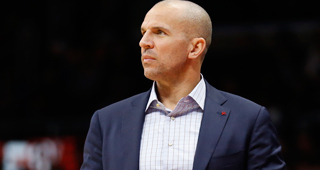Few players understood the game like Jason Kidd did. He was an impressive athlete with a trap door of a first step early in his career, but the reason he was effective deep into his thirties was a mastery of the way the other nine players moved around both ends of the floor. This sounds like an ordinary thing, but if you’ve watched Kidd play, you understand that it’s magical: the guy often occupied spaces he wasn’t supposed to be in. He didn’t jump passing lanes so much as he read them like road maps. He would drive at a slightly peculiar angle that would allow him to find a teammate who wasn’t open until the moment he dished the ball. When he arrived in Dallas in 2008, Rick Carlisle—a smart coach with an ego like five megaphones taped end-to-end—called plays for a few weeks before realizing that Kidd could run the show without any input from the sideline. The Mavericks won a title with a thirty-eight-year-old, pretty well washed up Kidd getting them into their sets, knocking down the odd three, and ripping the ball directly out of his opposite number’s hands at least once a night. He was running on pure guile and knowhow by that point. He still averaged 6.3 assists per game in the Finals.
So why has this genius been such a crummy coach? Kidd was justifiably fired by the Bucks on Monday, with the team continuing to play uninspired basketball that was doubly frustrating to behold considering they have the most dynamic player in the league in Giannis Antetokounmpo, and a roster of rangy athletes who can surely do something more effectual than chase the ball on defense and toss the it into the post on offense. Kidd constantly fiddled with his bench. He grumpily tussled with reporters who pointed out his mistakes. He aged so gracefully as a player, but as a coach, he displayed the kind of corrosive stubbornness that past-it superstars often do: he had a clear idea of how the Bucks should play and never considered any alternative. Like what obviously wasn’t working was suddenly going to click at some point. It didn’t, and he leaves behind one of the more enticing jobs in the league.
It makes sense that most great players don’t even try to become coaches. They probably remember what it was like to deal with less talented teammates and realize that it would be hell to make it their full-time job. Kobe Bryant tolerated Jordan Farmar because he could render him irrelevant simply by demanding the ball. If all he could do to mitigate Jordan Farmar’s problematic Jordan Farmar-ness was yell from the bench, a locker room murder-suicide would be in play by December of their first season together. It tends to be the role players, or guys who never played in the league at all, who have the patience for the grind of helping of a borderline professional become a useful bench player, or devising an offense that maximizes a thin squad’s none too readily apparent strengths. It’s unglamorous work that’s probably particularly difficult to embrace when your name has literally and figuratively been up in lights for a long time.
But on its face, if there were a Hall of Fame-caliber player who might be a good fit for the whistle and the clipboard, it would be someone like Jason Kidd, whose most outstanding asset as a player was operating on a higher intellectual plane than his peers. A big part of a coach’s job is watching games and figuring out—both in real time and night to night—what his team needs to do differently in order to win. That’s right in Kidd’s wheelhouse—or it seemed like it would be, anyway. In practice, Kidd was rigid and dense. The thing he got most correct during his Bucks tenure was empowering Giannis, a player with whom he genuinely connected, and giving the Greek Freak the creative leeway to become the many-splendored star he is today. Kidd was more of a charismatic mentor than a wiley chessmaster, and because that’s not really enough to justify a coach’s continued employment, he was dismissed at more or less the right time. Giannis isn’t a fledgling anymore; he can handle himself from here. He now needs a coach who can scheme and bring the best out of Tony Snell.
In the end, the most dispiriting aspect of Kidd’s foundering coaching career is the reminder that certain gifts die with the people who possess them. We know that athleticism can’t be taught—Vince Carter won’t be able to coach anybody to leap like he did at twenty-four—and that there are maneuvers like Dirk’s fadeaway, Kareem’s skyhook, LeBron’s crosscourt jump-passes that can be imitated but on some level belong incontrovertibly to their originators. But we like to think knowledge can be passed along, because we watch players learn new stuff and add to their games every season.
In theory, Jason Kidd should be able to get a team under his tutelage to play at least somewhat like he did: with wit and invention and a minimum of mistakes. Unfortunately, it’s not as simple as that, because there’s a difference between between information and intelligence, between intelligence and instinct. Some things can be communicated, some understood, and others only felt. See the game as I see it is not a usable instruction, and assuming your players will get what you easily grasp is bad coaching. Does Kidd know that? Regardless of what he’s learned or hasn’t, he failed in Milwaukee for the same reason a lot of coaches do: arrogance and obliviousness. What separates Kidd from most of his hapless predecessors is that he clearly has so much wisdom to give. Whether he can ever transmit it to his players—whether he’ll be given another chance to—remains to be seen.



